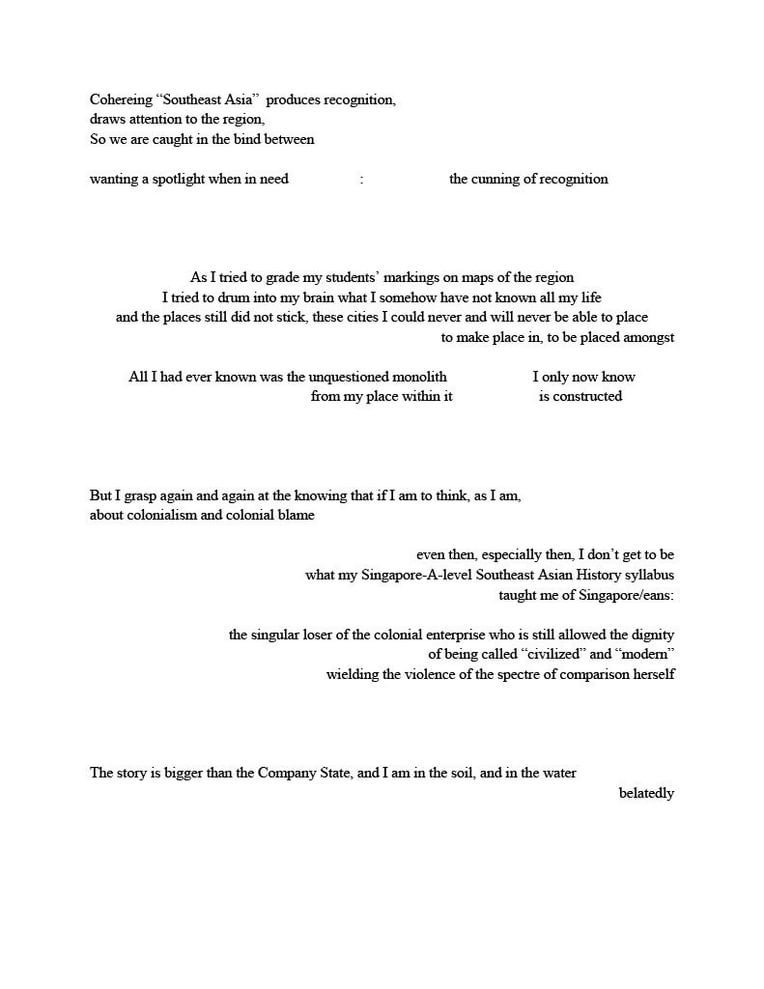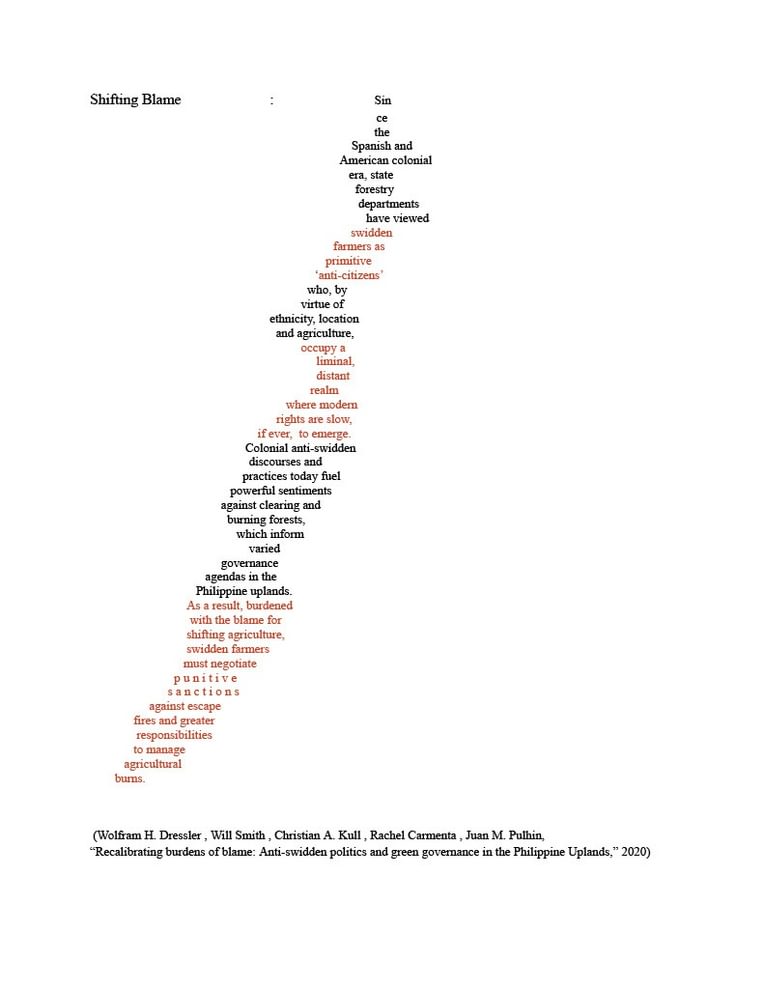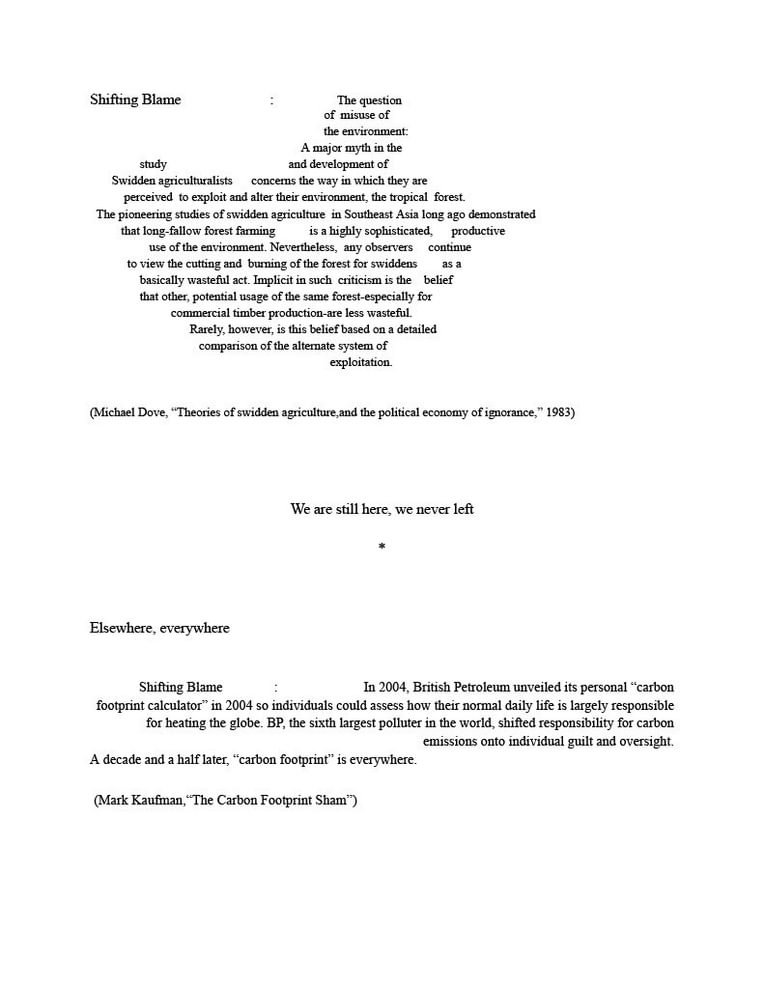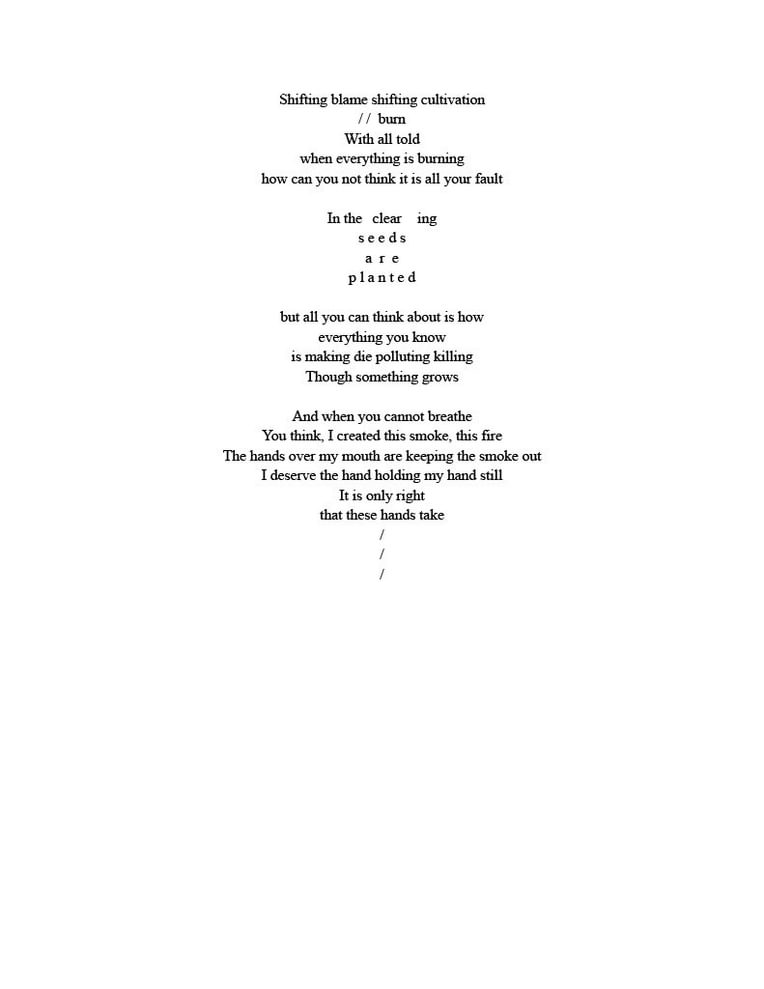/ and burn
From the Series: Un/tracing Empire: Pollinations between the Poetic and Ethnographic
From the Series: Un/tracing Empire: Pollinations between the Poetic and Ethnographic








This poem is part of my ongoing series of formal and methodological explorations of how the poetic holds within itself a built-in resistance to foreclosure as an expression of inquiry. I find that the poetic is a bespoke contraption for mapping out gestures which also embody the qualities that I seek in my ethnographic practice as an anthropologist: the poetic moves and is moved by the ethnographic object in motion (Tan, in press). “/ and burn” evokes the ethnographic encounter and dialogue with cited texts through formal interventions of calligrams. These suggest the arbitrariness of geographical formations and epistemological cleavages, with regards to the geopolitical carving out of Southeast Asia as a region and as a field of area studies. Thinking of the poem as “para-site” (Marcus, 2000) makes an explicit distinction from the poem as site and discloses the poem’s limitations in breaching that conflation. The poetic can serve as a problematic in marking out a reminder of that which exceeds the work which typically furnishes the object. In this way, the poem as text heightens but is aligned with ethnography’s boundary markings.
On the note of the encounter, the poetic is also an act of staging that lies between accident and hypothesis, spontaneity and predetermining: it makes political the act of marking ethnographic contingency. The poetic keys us into the possibility that the text can be non-isomorphic from its object, and that different sorts of literacies are prompts to other revelations. Following its charge can be a way of writing and doing ethnography that instantiates and creates, yet cedes to flow and force.
Bio:
Jill J. Tan is a writer, artist, and researcher committed to collaborative practice and multimodal exploration through games, performance, and poetics. As a PhD candidate in Anthropology at Yale University, she studies death and dying in Singapore, working with funeral professions and public-facing death literacy efforts. Her work appears or is forthcoming in Guernica, City and Society Journal, The Journal of Public Pedagogies, Palimpsest, Ghost Proposal; and the edited volumes Resistant Hybridities: Tibetan Narratives in Exile (Lexington), Death and the Afterlife: Multidisciplinary Perspectives from Asia (Routledge), and Detours: A Decolonial Guide to Singapore (Duke University Press). Her research is supported by the Wenner-Gren Foundation; a National University of Singapore Development Grant; the Tan Kah Kee and Tan Ean Kiam Foundations; and a Social Science Research Council Graduate Research Fellowship. She was a 2022 resident at Dance Nucleus, and co-created a featured program for The Studios 2022 at The Esplanade, Singapore’s national performing arts center. Tan’s multimedia hybrid poetics project “Notes on the bicentennial of a f/l/ound/er/ing (2019)” was awarded the 2022 Theron Rockwell Field Prize at Yale.
Conklin, Harold C. 1954. “An Ethnoecological Approach to Shifting Agriculture.” Transactions of the New York Academy Of Sciences II, 17.2: 133–142.
Dove, Michael. 1983. “Theories of Swidden Agriculture, and the Political Economy of Ignorance.” Agroforestry Systems 1: 85–99.
Dressler, Wolfram H., Will Smith, Christian A. Kull, Rachel Carmenta, and Juan M. Pulhin. 2021. “Recalibrating Burdens of Blame: Anti-swidden Politics and Green Governance in the Philippine Uplands.” Geoforum 124: 348–359.
Duncan, Christopher. 2004. “Legislating Modernity Among the Marginalized.” In Civilizing the Margins: Southeast Asian Government Policies for the Development of Minorities, edited by Christopher R. Duncan, 1–23. Ithaca, N.Y.: Cornell University Press.
Fortun, Kim. 2001. Advocacy After Bhopal: Environmentalism, Disaster, New Global Orders. Chicago: University of Chicago Press.
Kaufman, Mark. 2021. “The Carbon Footprint Sham: A ‘Successful, Deceptive’ PR Campaign.” Mashable.
Marcus, George E, ed. 2000. Para-Sites: A Casebook Against Cynical Reason. Chicago: University of Chicago Press.
Povinelli, Elizabeth A. 2002. The Cunning of Recognition: Indigenous Alterities and the Making of Australian Multiculturalism. Durham, N.C.: Duke University Press.
Scott, James C. 2010. The Art of Not Being Governed: An Anarchist History of Upland Southeast Asia. New Haven, Conn.: Yale University Press.
Tan, Jill J. In press. “Notes on the bicentennial of a f/l/ound/er/ing (2019).” In Detours: A Decolonial Guide to Singapore, edited by Cheryl Naruse, Joanne Leow, and Alfian Sa’at. Durham, N.C.: Duke University Press.
Tsing, Anna Lowenhaupt. 2005. Friction: An Ethnography of Global Connection. Princeton, N.J.: Princeton University Press.